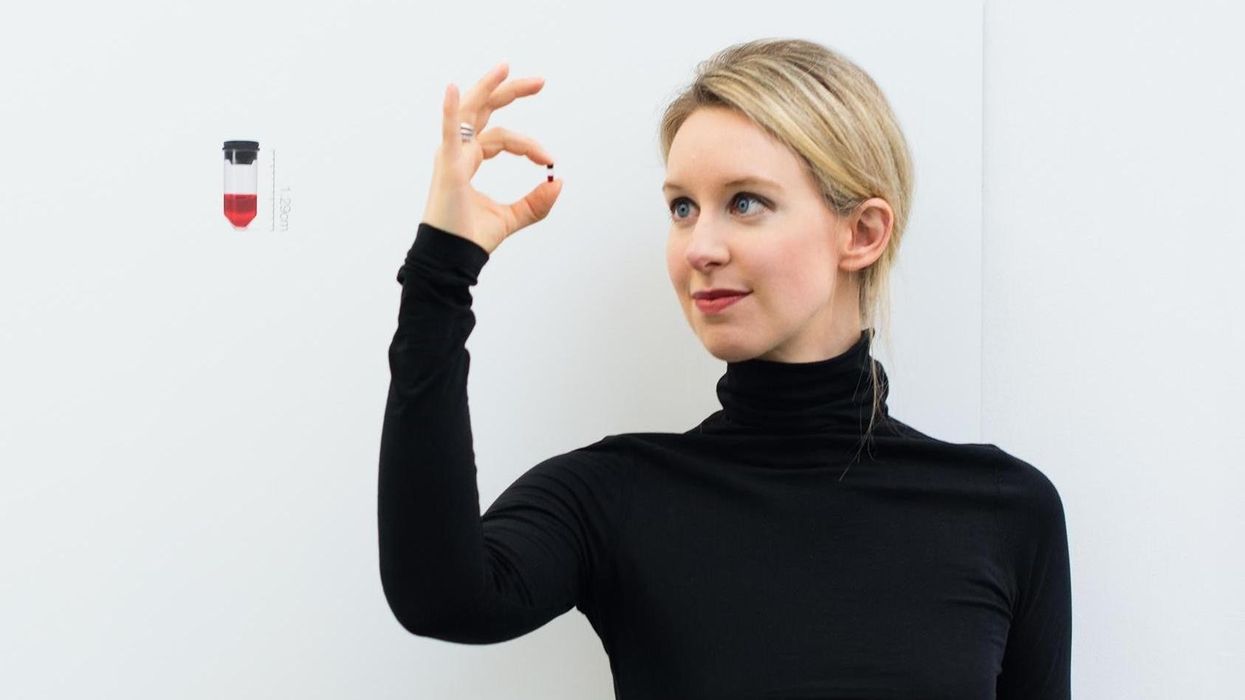'Fake It 'Til You Make It': Alex Gibney Explores the Theranos Scam
Fans of documentaries should prepare themselves for Oscar winner Alex Gibney's newest film.

The documentary, The Inventor: Out for Blood in Silicon Valley, follows young Silicon Valley upstart Elizabeth Holmes, who promised starry-eyed investors that her company had invented a new blood testing device that could screen for hundreds of diseases from a mere finger-prick of blood.
She was lying.
Her automated "mini-lab" testing device, which was called "the Edison," never worked.
Holmes duped investors, her board, the press, and the general public, until whistleblowers finally stepped forward and uncovered her scare tactics and layers of secrecy.
Gibney's film deftly unravels Holmes' deception and offers a rare glimpse into her company, comparing her rise to another inventor's -- Thomas Edison himself, perhaps the original proponent of "fake it 'til you make it." Edison claimed to have invented the incandescent light bulb long before he had gotten the thing to actually work, failing multiple times before succeeding.
There's also the fact that the light bulb isn't a medical device upon which people might be relying for life-saving diagnoses.
The Inventor solidifies this connection by using some of Edison's old silent film sequences, showing how Edison had a flair for big stories, just like Holmes did.
The Inventor premiered at Sundance on Jan. 24 but will also screen at SXSW on March 13.
Gibney and the film's producers, Jessie Deeter and Erin Edeiken, sat down with reporters ahead of their SXSW screening.
On what subjects attract him
Gibney has made several documentaries about big public figures and the sort of cults of personality that they often foster. For example, The Man in the Machine followed Steve Jobs. Going Clear examined the literal cult of Scientology. One reporter asked about this tendency.
"I can't say I thought about it in advance," Gibney said, "but it's clearly something that I'm interested in, because it keeps coming up over and over again. My friend Larry Wright, who lives here in Austin, had the best phrase around it. He called it 'The prison of belief.' That's the subhead of the Scientology film. And for Elizabeth I think it was a prison of belief, and I think she believed she would get there. And therefore, she was entitled to fake it until she made it."
Gibney said he was also just attracted to "a good story." And there was plenty to explore within Holmes' schemes to support a feature-length documentary.
Deciding what to include
Theranos' lies were uncovered when John Carreyrou broke the story for the Wall Street Journal. His subsequent book, Bad Blood: Secrets and Lies in a Silicon Valley Startup, is a definitive account of Holmes and the company. Carreyrou appears in Gibney's documentary as one of several journalists who had dealings with Holmes.
The book is a rich resource, but Gibney had obvious time constraints on what he could include in his documentary.
"I mean, that book has got an incredible amount of detail," he said. "But at the end of the day, the film has to go where the film can. And often that means where the image is. And so we focused on this area of Elizabeth's sort of economic prominence, and found what we could along the way."
The book includes more about Holmes' affectations (many say her deep voice is fake) and her fight to secure patents.
"There's a wonderful episode in John's book early on, when a number of people felt that Elizabeth didn't have the maturity or the wisdom to be the chairman of the board, and they were gonna kick her off," Gibney said. "And then she walked in, and in two hours had persuaded them all to back down. And these were very powerful people. And I thought that was interesting and instructive. So there were a lot of things in John's book I would have liked to have included."
Empathize with your subjects (or at least try to)
At one point, Deeter sat down with what she said was a five-hour dinner with Holmes during which the young woman tried to get as much advance information about the documentary as she could.
"I genuinely like all my characters, even if they're 'bad people,' or they've done bad things."
"Anecdotally, my husband makes fun of me, because I genuinely like all my characters, even if they're 'bad people,' or they've done bad things," Deeter said. "I really kind of like people. And I found that I did find it difficult to relate to her as a person. Like at one point I said, you know, I was fishing for anything we might have in common."
Deeter remembered that Holmes was made to learn Chinese from a young age, and tried to relate this to the way Deeter was raising her own children.
"And I was like, 'God, you know, my kids, I wouldn't even have wanted to learn a language at that age, and my kids sure would never want to learn -- like they're not voluntarily even learning Spanish, right?' And I'm like, 'What's up with that?'"
Holmes told Deeter, apparently eerily, "I was a good girl."
"So I'm like, 'Oh God, okay,'" Deeter said with a laugh.
The Inventorpremieres on HBO on March 18.
For more, see our ongoing list of coverage of the 2019 SXSW Film Festival.
No Film School's podcast and editorial coverage of the 2019 SXSW Film Festival is sponsored by Blackmagic Design.


 Richard Gere and Uma Thurman in 'Oh, Canada' via Kino Lorber
Richard Gere and Uma Thurman in 'Oh, Canada' via Kino Lorber  Uma Thurman in 'Oh, Canada'via Kino Lorber
Uma Thurman in 'Oh, Canada'via Kino Lorber 









